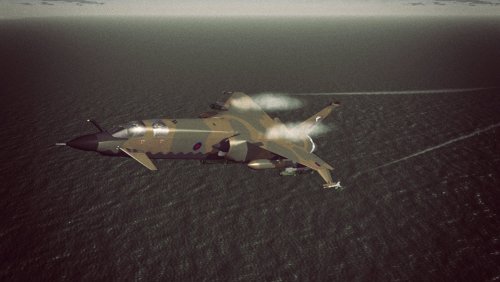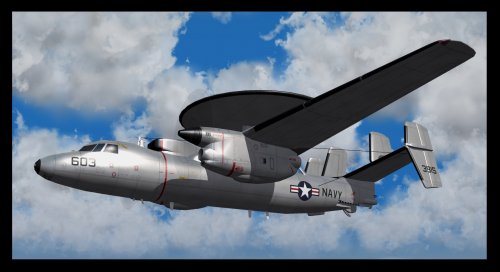-
Content count
9,300 -
Joined
-
Last visited
-
Days Won
497
Content Type
Profiles
Forums
Calendar
Gallery
Downloads
Store
Everything posted by Spinners
-

What If Screenshot Thread.......
Spinners replied to Dave's topic in Thirdwire: Strike Fighters 2 Series - Screen Shots
Paran's first jet fighter -

The Martin-Baker Vortex
Spinners replied to Spinners's topic in Thirdwire: Strike Fighters 2 Series - Sci-Fi/Anime/What If Forum
Martin-Baker Vortex FB.Mk.II - No.303 Squadron, RAF 2TAF, 1946 Skin Credit: Charles- 1 reply
-
- 2
-

-

The Martin-Baker Vortex
Spinners posted a topic in Thirdwire: Strike Fighters 2 Series - Sci-Fi/Anime/What If Forum
Martin-Baker Vortex FB.2 - No.6 Squadron, RAF Middle-East Command, 1949 Skin Credit: Charles- 1 reply
-
- 4
-

-

The Spitfire F.Mk.24's of Kosciuszko Squadron
Spinners replied to Spinners's topic in Thirdwire: Strike Fighters 2 Series - Sci-Fi/Anime/What If Forum
I nigdy nie będzie! I'm still getting to grips with English so I hope Google translate got that right. -

What If Screenshot Thread.......
Spinners replied to Dave's topic in Thirdwire: Strike Fighters 2 Series - Screen Shots
Supermarine Spitfire F.24 - No.303 (Polish) Squadron, RAF, 1947 -

What If Screenshot Thread.......
Spinners replied to Dave's topic in Thirdwire: Strike Fighters 2 Series - Screen Shots
Greek Thunderchief over Cyprus, 1974 -

What If Screenshot Thread.......
Spinners replied to Dave's topic in Thirdwire: Strike Fighters 2 Series - Screen Shots
Ilyushin Il-28 Beagle - Grupo 1 de Bombardeo, Fuerza Aérea Argentina, 1961 -

What If Screenshot Thread.......
Spinners replied to Dave's topic in Thirdwire: Strike Fighters 2 Series - Screen Shots
The Devil & The Lightning -

What If Screenshot Thread.......
Spinners replied to Dave's topic in Thirdwire: Strike Fighters 2 Series - Screen Shots
Relámpago Español -

Strike Fighters 2 Screenshots Thread
Spinners replied to Wrench's topic in Thirdwire: Strike Fighters 2 Series - Screen Shots
Tornado F3 APC -
-

What If Screenshot Thread.......
Spinners replied to Dave's topic in Thirdwire: Strike Fighters 2 Series - Screen Shots
Boeing F-112J Thunderstrike - VMFA-232, United States Marine Corps, 1972 -

Argentina's Naval MiG-19's
Spinners replied to Spinners's topic in Thirdwire: Strike Fighters 2 Series - Sci-Fi/Anime/What If Forum
Doesn't it just! -

Argentina's Naval MiG-19's
Spinners posted a topic in Thirdwire: Strike Fighters 2 Series - Sci-Fi/Anime/What If Forum
Mikoyan-Gurevich MiG-19SK "Farmer-N" - 3 Escuadrilla de Caza y Ataque, Comando de la Aviación Naval, 1970 This is the lovely MiG-19SK by Cocas. Skin Credit: Nyghtfall -

Strike Fighters 2 Screenshots Thread
Spinners replied to Wrench's topic in Thirdwire: Strike Fighters 2 Series - Screen Shots
The Eternal Foe -

What If Screenshot Thread.......
Spinners replied to Dave's topic in Thirdwire: Strike Fighters 2 Series - Screen Shots
Bullpup Bomber -

Aeronautica Militare Superbolts
Spinners posted a topic in Thirdwire: Strike Fighters 2 Series - Sci-Fi/Anime/What If Forum
Republic P-72C Superbolts - 51º Stormo, Aeronautica Militare, 1948 Skin Credit: Charles -

New eyes for the Senior Service
Spinners posted a topic in Thirdwire: Strike Fighters 2 Series - Sci-Fi/Anime/What If Forum
Grumman E-2K Hawkeye AEW.1 - 849 Naval Air Squadron, Royal Navy, 1982 Skin Credit: pappychksix -

New eyes for the Senior Service
Spinners replied to Spinners's topic in Thirdwire: Strike Fighters 2 Series - Sci-Fi/Anime/What If Forum
-
Version 1.0.0
210 downloads
Grumman E-2K Hawkeye AEW.1 - For Strike Fighters 2 North Atlantic This is a simple mod of the stock non-flyable Third Wire E-2C to create a fictional Hawkeye AEW.1 in service with the Fleet Air Arm of the Royal Navy. You simply must have Strike Fighters 2 North Atlantic - it will not work in any other game. INSTRUCTIONS 1. From the AIRCRAFT folder drag and drop the E-2K folder into your Aircraft folder. 2. From the DECALS folder drag and drop the E-2K folder into your Decals folder. That's it! CREDITS Thanks to Third Wire Productions for a great little game/sim. Special thanks to pappychksix for the E-2C 'Late' skin which I've resized down to 2048x2048. And thanks to everyone in the wider Third Wire community. Regards Spinners Version 1 - 18/01/19- 1 review
-
- 1
-

-
- fleet air arm
- hawyeye
-
(and 1 more)
Tagged with:
-

What If Screenshot Thread.......
Spinners replied to Dave's topic in Thirdwire: Strike Fighters 2 Series - Screen Shots
For the price of a tiddy oggy Yes, but I'll need to sort out the tail marking as the horiz' stab breaks through the fin at each end causing any fin decals to also show on the underside of the horiz' stab -

What If Screenshot Thread.......
Spinners replied to Dave's topic in Thirdwire: Strike Fighters 2 Series - Screen Shots
Grumman E-2K Hawkeye AEW.1 - 849 Naval Air Squadron, Royal Navy, 1982 -

What If Screenshot Thread.......
Spinners replied to Dave's topic in Thirdwire: Strike Fighters 2 Series - Screen Shots
Bell F-109C - VF-1, US Navy, 1974





